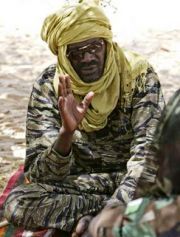Rebel movement proclaims 3 new states in Sudan’s Darfur
January 12, 2008 (LONDON) — Darfur rebel Justice and Equality Movement announced today the establishment of three new states in war torn Darfur region. JEM said this move is imposed by the need for true civil authority in controlled areas

The creation of the three states is justified by the fact “most of Darfur has now come under control of JEM; and in response to the genuine popular need for establishment of new States and commencement of true civic authority;” the leader of rebel movement said.
Further JEM specified that Al Wahat State includes: Area covering all the territory at the Egypt-Sudan border west of the River Nile; Territory at Sudan’s side of all Libyan-Sudan border; Northern Zone of Sudan-Chad Border and Oases of Wahat Al Rahib, Wahat Jabarona, Wahat Ghibaish, Wahat An Nukhila, Wahat Al Mutaz, Aahat Al Fagi and Wadi Hawar.
While Jabal Mara State includes Jabal Mara, Nertiti, kas, Wadi Salih, Sullu, Umkher. Um Dukhun, Mukjar and garseila.
The third state, Bahr Alghazal covers El Deain, Adayla, Giraida, Wad Hijab, Al Radum, Al Amoud Alekhdar, hufrat en Nahas, Kafia Kingi, Bahr Alarab and Abu Karaynka.
These three states correspond in fact to North Darfur, South Darfur and West Darfur states.
Besides these states JEM also established three districts: Seliea District with Seleia as capital, Kornoi District with Kornoi as capital and Wad Ginja District with Wad Ginja as capital
The Darfur rebel Justice and Equality Movement (JEM), which the Khartoum government says is backed by Chad, has said it is stepping up its attacks in the area around Geneina. However Khartoum played down rebel claim of surrounding the capital of West Darfur.
The African Union-United Nations force of 26000 troops started deployment of its troops in the region in accordance with a UN Security Council resolution adopted at the end of July 2007; but only a little over a third of those are so far in place and the UNAMID force faces several difficulties.
(ST)
